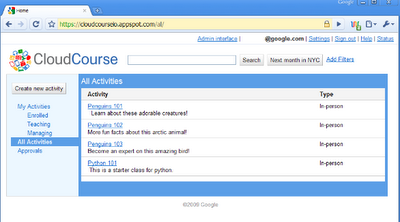 After the announcement of Google’s CloudCourse being open-sourced, I decided to give it a try and see exactly what’s under the hood…at the very least, it would give me a chance to try out a Django app via Google App Engine, which alone is worth the time.
After the announcement of Google’s CloudCourse being open-sourced, I decided to give it a try and see exactly what’s under the hood…at the very least, it would give me a chance to try out a Django app via Google App Engine, which alone is worth the time.
Long story short: I got CloudCourse up and running in a matter of minutes.
Any hullabaloo that CloudCourse as it stands now is a serious contender to existing full-featured online learning systems like Sakai, Moodle, Blackboard, or Desire2Learn is premature. CloudCourse is at its root a scheduling and rostering application, clearly designed for the internal training needs it was apparently developed to serve. No educational institution will be migrating from their current LMS to CloudCourse any time soon.
On the other hand, CloudCourse comes very close to serving a large chunk of the needs of commercial training: an application that enables various training opportunities to be scheduled, attendees to register, and attendance to be recorded. As long as training and assessment materials are developed and delivered externally, CloudCourse’s open source Django foundation would allow relatively easy integration with any remaining missing pieces, such as ecommerce integration, certification, etc. A small commercial training firm with some technical expertise or a larger firm with sizable internal training needs might pick up CloudCourse and extend it to their needs without huge effort.
The larger, subterranean story here is that with CloudCourse, Google adds one more (little) tool into its suite of not-yet-fully-integrated applications that together do indeed approximate—and in some cases far outstrip (eg, Google Wave)—current LMS capabilities. If Google decided to focus on this area and integrate its various offerings—probably not so much for profit as for mindshare—the capabilities they could offer at a price that would blow proprietary systems out of the water would radically transform the educational technology space.
People complain about Blackboard’s near monopoly now, but in a couple of years, Google could make Blackboard cease to matter—if Google decided to bother. Open source communities like Sakai and Moodle should also take heed: we offer deep value neither Google nor any of the proprietary LMS platforms offer, but where, when, and how do we add value in an environment where the cost of the educational technology infrastructure approaches zero?
For Google, one huge issue remains: how to gain trust in the storage and use of educational data. After all, we’re talking about our children here, and as any student of history knows, nothing is more sacred than our children.